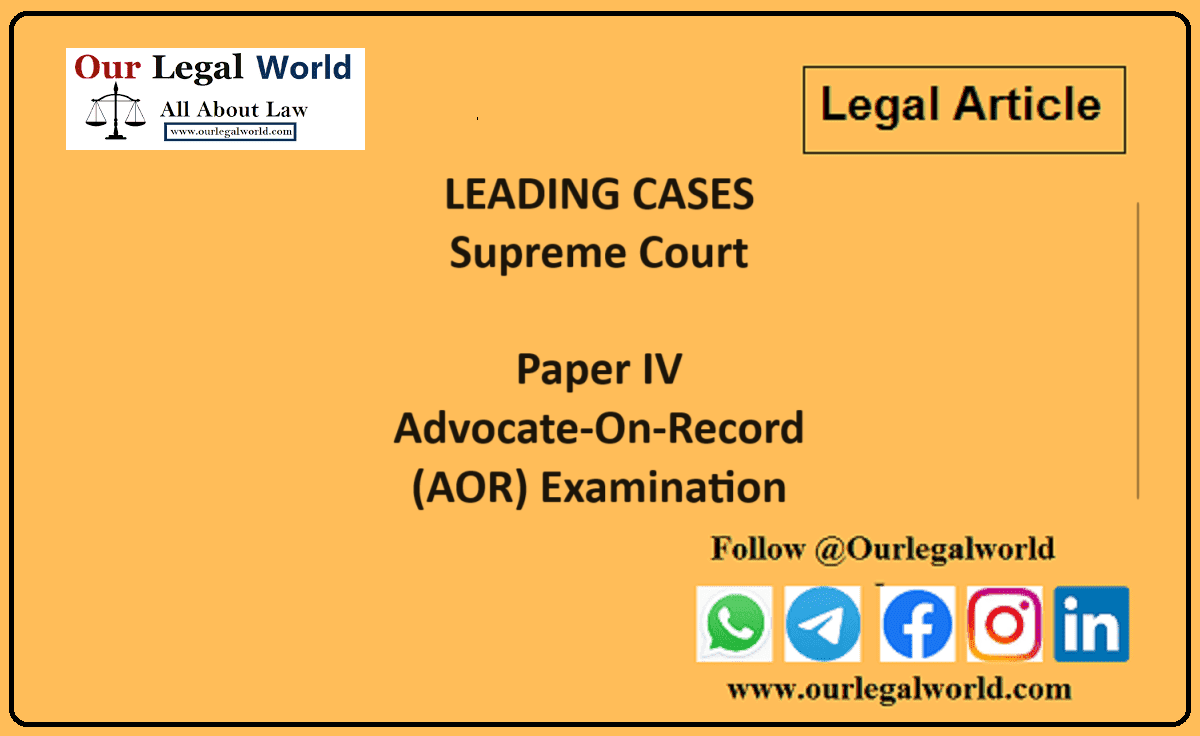Very important Illustrations of Res Judicata or Section 11 of CPC
Let us consider few illustrations / Example to understand the doctrine of res judicata:
The meaning of “res” is “everything that may form an object of rights and includes an object, subject matter or status” and res judicata means “a matter adjudged; a thing judicially acted upon or decided; a thing or matter settled by judgement”
Escorts Farms Ltd v. Commissioner, Kumaon Division, Nainital, AIR 2004 SC 2186
Res Judicata is a phrase which has been evolved from a Latin maxim, which stand for ‘the thing has been judged‘, meaning there by that the issue before the court has already been decided by another court, between the same parties. Therefore, the court will dismiss the case before it as being useless.
(1) A sues B for damages for breach of contract. The suit is dismissed. A subsequent suit by A against B for damages for breach of the same contract is barred. A’s right to claim damages from B for breach of contract having been decided in the previous suit, it becomes res judicata, and cannot, therefore, be tried in the subsequent suit. B cannot be vexed twice over for the same cause (breach of contract). Moreover, public policy also requires that there should be an end to litigation and for that reason, the previous decision must be accepted as correct, lest every decision would be challenged on the ground that it was an erroneous decision and there would be no finality.
(2) A sues B for possession of certain properties based on a sale deed in his favour. B impugns the deed as fictitious. The plea is upheld and the suit is dismissed. A subsequent suit for some other properties on the
basis of the same sale deed is barred as the issue about the fictitious nature of the sale deed was actually in issue in the former suit directly and substantially.
Also Read: Concept of Res Sub Judice under Section 10 of CPC- 1908
(3) A sues B, C and D and in order to decide the claim of A, the court has to interpret a will. The decision regarding the construction of the will on rival claims of the defendants will operate as res judicata in any subsequent suit by any of the defendants against the rest.
(4) A files a petition in a High Court under Article 226 of the Constitution for reinstatement in service
and consequential benefits contending that an order of dismissal passed against him is illegal. The petition is dismissed. A cannot thereafter file a fresh petition in the Supreme Court under Article 32 of the Constitution nor can institute a suit in a civil court as such petition or suit would be barred by resjudicata.
(5) A sues B for possession of certain property alleging that it has come to his share on a partition of joint family property. B’s contention that the partition has not taken place is upheld by the court and the suit is dismissed. A subsequent suit by A against B for partition of joint family property is not barred.
(6) A, claiming himself to be the owner of the property files a suit for eviction of tenant B and sub-tenant C which is decreed ex parte by a Small Cause Court. C then files a suit in the civil court on the basis of title. A pleaded res judicata in the light of the decree passed in the former suit. The finding regarding ownership of A will not operate as res judicata inasmuch as a title to the property was not directly and substantially in issue in the former suit.
(7) A, a partnership firm, filed a suit against B to recover Rs 50,000. The suit was dismissed on the ground that it was the partnership was not registered as required by the provisions of the Indian Partnership Act, 1932. The firm was thereafter STATUTE PILOT registered and a fresh suit was filed against B on the same not maintainable since cause of action. The suit is not barred by resjudicata.
(8) A files a petition in a High Court under Article 226 of the Constitution for reinstatement in service and consequential benefits contending that an order of dismissal passed against him is illegal. The petition is dismissed on the ground that disputed questions of fact are involved in the petition and alternative remedy is available to the petitioner. A suit in a competent civil court after dismissal of the petition is not barred by resjudicata.
(9) A sues B for a declaration of title to certain lands; and (ii) for the rent of those lands. B denies A’s title to the lands and also contends that no rent is due. In this case, there are two matters in respect of which relief is claimed, viz. (i) the title to the lands; and (I) the claim for rent. Both these matters are, therefore, directly and substantially in issue.
Also Read: ROLE OF TAX TREATIES Written by Advocate Ashish Panday
(10) A sues B for rent for the year 1989-90 alleging that B was liable to pay it. B applied for time to file the written statement, which was refused. The only issue raised by the court was regarding the amount of rent and the suit was decreed. A files another suit against B for rent for the year 1990-91. B contends that he is not liable to pay rent. The question about B’s liability for all years was not alleged and decided in the previous suit and the point was, therefore, not directly and substantially in issue in the previous suit. The
defence is, therefore, not barred by resjudicata.
(11) A sues B for possession of property on the basis of ownership. The suit is dismissed. A cannot thereafter claim possession of property as mortgagee as that ground ought to have been taken in the previous suit as a ground of attack.
(12) A files a suit against B for a declaration that he is entitled to certain lands as heir of C. The suit is dismissed. The subsequent the suit, claiming the same property on the ground of adverse possession, is barred by constructive resjudicata.
(13) A files a suit against B to recover money on a pronote. B contends that the a promissory note was obtained from him by undue influence. The objection is overruled and suit is decreed. B cannot challenge the promissory note on the ground of coercion or fraud in a subsequent suit, inasmuch as he ought to have
taken that defence in the former suit.
(14) A sues B to recover damages for a breach of contract and obtains a decree in his favour. B cannot afterwards sue A for recession of contract on the ground that it did not fully represent the agreement between the parties, since that ground ought to have been taken by him in the previous suit as a ground of defence.
(15) A sues B for possession of certain property alleging that it has come to his share on partition of joint family property. B’s contention that the partition has not taken place is upheld by the court and the suit is dismissed. A subsequent suit by A against B for partition of joint family property is not barred.
(16) As a mortgagor A sues B for the redemption of certain property alleging that he has mortgaged it with possession to B. The mortgage is not proved and the suit is dismissed. A file another suit against B for possession of the same property claiming to be the owner thereof. The suit is not barred.
(17) A sues B to recover certain property alleging that B was holding the property under a lease, which had expired. The lease is not proved and the suit is dismissed. A subsequent suit by A against B on the basis of general title is not barred.
(18) A sues B for a declaration that he is entitled to certain property as an heir of X. The suit is dismissed. A files another suit for injunction on the ground that he had become an owner of the property by adverse possession. This ground was available to him even at the time of previous suit but was not taken at that time. The subsequent suit is barred.
(19) A sues B for a declaration that he is the owner of certain property. The suit is dismissed holding that he is not the owner. At the time of the suit A is in adverse possession of the property but has not perfected his title. After the statutory period, A files another suit on the basis of his title by adverse possession. The suit is not barred.
(20) A sues B for possession of property as an owner basing his claim on title. The suit is dismissed. A subsequent suit for possession of property on the ground of adverse possession is barred.
(21) A sues B for possession of property as an owner basing his claim on title. The suit is dismissed. A subsequent suit by A against B for possession of the same property as mortgagor is not barred
(22) A sues for possession of math property as an heir of Mahant. The suit is dismissed. A subsequent suit by A against B as the manager of the math is not barred.
(23) A sues B for title to the property as an heir of C under the customary law. The suit is dismissed. The subsequent suit for title to the property as an heir of C under personal law is barred.
Illustrations of Res Judicata







![Tax Law Internship at Legum Attorney [Chamber of Ashish Panday], Delhi : Apply by 15th May 2025](https://www.ourlegalworld.com/wp-content/uploads/2025/05/IMG_0113-min.png)

